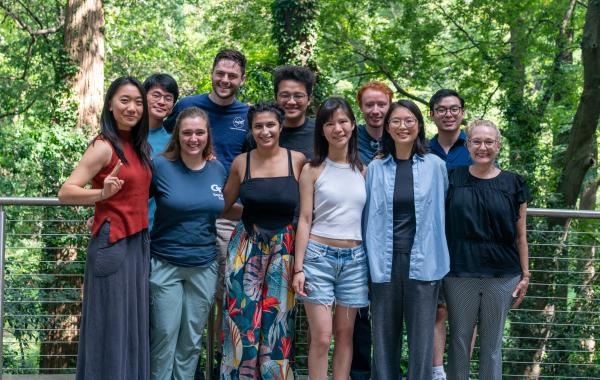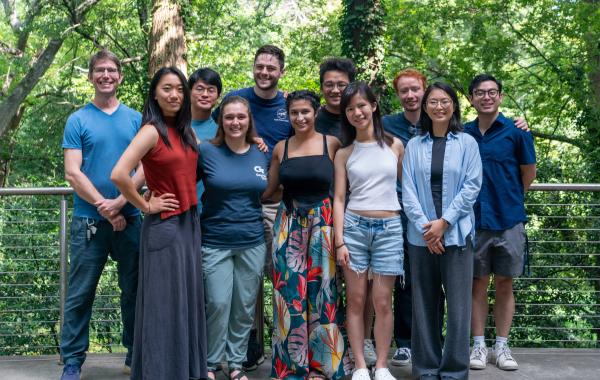Georgia Tech QBioS Introduces the Fall 2025 PhD Cohort

2025 QBioS PhD Cohort
The Quantitative Biosciences Interdisciplinary PhD program at Georgia Tech welcomed 11 new doctoral students to our program starting 2025-2026. They are the 10th class of incoming students for our program, which first enrolled students in fall 2016. Here are some details about our newest cohort.
Sierra Bornheim graduated from Brown University with a double major in Biology and Human Evolution in 2024. Her undergraduate research focused on reconstructing past environmental conditions at archaeological sites and sea turtle foraging ecology. At Georgia Tech, she plans to study paleoecology, using data from the fossil record to predict impacts of current climate change on different groups of animals. Sierra says, “I chose QBioS because of the rigorous quantitative training it offers, which is uncommon in graduate programs in paleontology. I’m excited to get to know people from many different fields and learn from them.”
Marissa Douglas graduated from Harvey Mudd College, Claremont, California ’25 with a degree in Mathematical and Computational Biology. She grew up in the Pacific Northwest and developed a fondness for wildlife, leading to a passion in species conservation. She always knew she wanted a career focused around understanding and protecting animals, and used her research at during her undergraduate education to explore interspecies interactions, population modeling, and sensory and motor physiology. She decided to attend Georgia Tech because the “rigorous quantitative tools will allow me to transform behavioral and ecological data into large scale models capable of advising conservation efforts.”
Brice Edelman graduated from Georgia Tech in 2020 with a B.S. in Industrial Engineering. Now a Ph.D. student in the Center for the Study of Systems Biology, his previous work has involved developing computational models of biology across scales, from protein–protein interaction mapping to tracing population-level clinical event trajectories. His goal as a Ph.D. student is to probe how intelligence emerges in living systems. His work focuses on how brains encode and compose concepts, the mechanisms of creativity, the role of temporal coding in neural computation, and the striking energy efficiency of biological brains. He aims to translate these principles into more capable, efficient artificial intelligences while deepening our understanding of the mind. Brice says, “I chose the QBioS program because its rigorous, interdisciplinary training lets me explore how the fields of biology, neuroscience, information theory, and artificial intelligence can each provide new insights for understanding and pushing forward the others."
Debapriya Ghosh completed her Master's from Indian Institute of Technology Kharagpur, India and started graduate school in the Fall 2023 at UNC Chapel Hill. She transferred to Georgia-Tech and she is excited to join the QBioS program and Simon Sponberg's lab. According to Debapriya, “I chose the QBioS program to sharpen my quantitative and computational skills as I begin exploring the moth brain!”
Yunfei “Daisy” Lyu - Details coming soon!
Johnathan Shih graduated from Texas A&M University with a bachelor's in Statistics and a minor in Computer Science. During his undergraduate studies, he discovered his interest in microbiome research while conducting bioinformatics work on small animal microbiomes in a GI lab. Following graduation, he became a bioinformatics technician in the Kwon Lab at the Ragon Institute, where he supported clinical trials and microbiome studies through statistical modeling and sequencing pipeline development. "I chose QBios because of its focus on interdisciplinary work, and I believe this was the place where I could develop the modeling skills needed to address crucial biological problems”.
Brendan Shrader graduated from the University of Central Florida in 2025 with a B.S. in Mathematics and a minor in Computer Science. While there, he completed an Honors Undergraduate Thesis under the mentorship of Dr. Zhisheng Shuai on a new epidemiological model with partial immunity and post-infection mortality. In 2024, he spent his summer at the Georgia Tech Math REU and worked on a wide range of differential equation models for Pseudomonas aerugionsa quorum sensing and population dynamics under the mentorship of Dr. Rachel Kuske and Dr. Sam Brown. He is generally interested in applying differential equation and stochastic modeling to a wide range of biological problems at the microscopic level, using both old-school paper-and-pencil analysis and new computational tools. Brendan says, "I chose the QBioS program because I had a great time at GT last summer, and it allows me a lot of flexibility when it comes to choosing courses and labs that match my interests."
Makoto Ueki, originally from Japan, completed his Master’s degree in Mathematical Modelling at the University of Oxford in 2024. He conducted his thesis research on the application of stochastic models to disease infection models. In the QBioS PhD program, he is passionate about understanding how biophysics shapes the transition from unicellularity to multicellularity under the co-supervision of Dr. Peter Yunker and Dr. William Ratcliff. According to Makoto, “The QBioS program is the right program for me to learn key biological knowledge while further building up my skills in physics, mathematical modelling, and computational simulations. I am excited to do my research across the border of physics and biology.”
Yufei Xiao is interested in collective behavior spanning from field to theory. She graduated with a bachelor's degree in computational and mathematical modeling from Minerva University. Prior to beginning her PhD, she conducted research on modular information flows in fish schools and dynamic cell-cell adhesion in developing embryos. Yufei says, "I chose Georgia Tech and the QBioS program to collaborate with researchers studying the mechanics, collective dynamics, and ecological aspects of living systems across scales."
Kaiyi Zhou earned her bachelor’s degree in Bioinformatics from The Chinese University of Hong Kong, Shenzhen. As an undergraduate, she focused on studying protein dynamics and drug discovery through molecular dynamics simulation. At Georgia Tech, she is interested in developing and applying computational approaches for understanding biomolecular mechanisms at the atomic level. “I chose the QBioS program because of its vibrant interdisciplinary community. It’s the perfect place for me to combine my passion for computation and biology, and to grow as a scientist alongside inspiring peers and mentors.”
Jin Zhu graduated from Shanghai Jiao Tong University with both a bachelor's and a master's degree in mechanical engineering. In Dr. Zijie Qu's Lab, his work involved systematically investigating bacterial locomotion, including bacterial propulsion, planktonic swimming, and collective motion, all using self-designed experimental setups. What excites Jin about the QBioS program at Georgia Tech is its highly interdisciplinary nature. The wide range of faculty expertise and course offerings enable him to study biological systems from multiple perspectives. He is particularly interested in exploring how organisms interact with and adapt to their environments through evolution. Jin says: “QBioS is the perfect place for me to study at the intersection of disciplines. The quantitative methods I learn here will greatly empower my future research.”

2025 QBioS PhD Cohort plus Program Manager

2025 QBioS PhD Cohort plus Director
